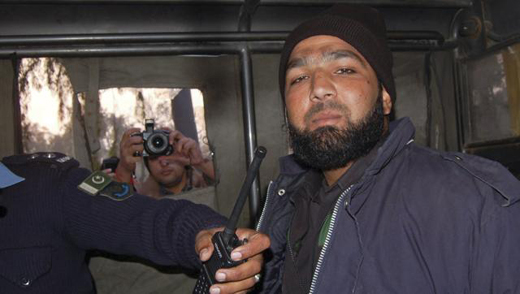Pak hangs man who killed governor over call to reform blasphemy law
Mangalore Today News Network
Islamabad, Feb 29, 2016: Protests have erupted in different parts of Pakistan after Mumtaz Qadri, the self-confessed killer of former Punjab governor Salman Taseer was hanged at Rawalpindi’s Adiala Jail on Monday morning.

Main roads were blocked as news spread of the hanging with supporters of different religious parties coming out on the streets to protest the hanging.
Aijaz Qadri of the Sunni Tehreek, a sectarian organisation which had launched a campaign to free Mumtaz Qadri, said that his party was very angry with the death. “We will express our sorrow and anger in the coming days,” he told the media, adding that he had asked all shops and schools to be closed on Monday in respect for Mumtaz Qadri.
“Qadri was hanged at around 4:30 am,” senior police officer Rizwan Omar Gondal told Reuters by telephone
Qadri, a former police commando, assassinated Taseer in Islamabad’s Kohsar Market on January 4, 2011 for his support to a blasphemy accused.
Taseer had championed the cause of a Christian woman sentenced to death in a blasphemy case that arose out of a personal dispute. Taseer had said the law was being misused and should be reformed
Late in 2011, an anti-terrorism court handed down a double death sentence to Qadri for murder and terrorism. The sentence was appealed and upheld by the Supreme Court late last year. A review petition of Qadri was also turned down by the top court on December 14 last year, leaving him with the last option of to file a clemency appeal to the President. The plea was turned down last week.
More than 100 people are charged with blasphemy each year in predominantly Muslim Pakistan, many of them Christians and other minorities.
Conviction of blasphemy carries a death sentence, although no one has yet been executed for the charge.
Controversy over the law has exposed the growing gap between religious conservatives and liberals in Pakistan, with hard-line religious leaders considering Taseer a blasphemer himself for even criticising the law.
Some lawyers showered Qadri with rose petals when he first arrived in court days after the killing. The judge who first convicted him was forced to flee the country after death threats.
- Mangalore SEZ and ETAG exchange EOI to commence ETAG Energietechnik enterprise
- Kotekar Co-op Bank dacoity case: 4 arrested; nearly 18 kg gold, Rs 3.8 lakh cash recovered: Commissioner
- Udupi: Private school at Kunjibettu receives bomb threat; students evacuated
- Mangaluru: Fire damages godown near Jeppinamogaru
- I feel like I am reborn, says Laxmi Hebbalkar after being discharged
- Udupi: Bagalkote man arrested for sexually abusing minor girl
- Udupi: Fire mishap in godown causes huge loss
- Sullia: Wild elephant found dead in reserve forest area
- Centenary Celebrations of Shri Sudhindra Tirtha Swamiji at Mangaluru’s Venkataramana Temple
- Minister Dinesh Gundu Rao condemns attack on unisex salon in Mangaluru
- Vintage Vehicle Exhibition Draws Enthusiastic Crowd at Nehru Maidan
- Republic Day Celebrated with Patriotic Fervour in Mangaluru and Udupi
- Shekhar Gupta to deliver 9th M V Kamath Endowment Lecture at Manipal
- Four soldiers injured in road mishap in J&K’s Poonch
- MUDA scam: Lokayukta submits probe report to Karnataka High Court
- Delhi polls: Free bus travel, 50% concession in Metro fares for students in AAP manifesto
- South India’s cultural diversity celebrated at Rashtrapati Bhavan
- Maharashtra reports first death due to Guillain-Barre Syndrome amid rising cases in Pune
- Honnavar cow slaughter case: Police offer ₹50,000 reward for information on key accused
- Members suggest 572 amendments to Waqf bill
- Uttarakhand is first state to enforce Uniform Civil Code
- India Celebrates 76th Republic Day with Grandeur and Unity
- Rohit Sharma named skipper of ICC men’s T20I of year, Bumrah, Pandya, Arshdeep also in squad
- Planetary Parade 2025: How and where to see this rare celestial event in India
- Lokayukta Police submits report to court in MUDA case involving CM Siddaramaiah, his wife
- Sandhya Shenoy honored with Society for Materials Chemistry Medal-2024
- White Cornus Apartment in Mangaluru
- City girl wins first place in state-level spell bee competition
- Alleged ‘Love Jihad’ Case in Mangaluru: Woman left home voluntarily, says police
- Girl fatally struck by reckless two-wheeler near Belman
- New residential complex for the judges inaugurated in Mangaluru
- Absconding accused nabbed after 8 years
- Truck with cylinders turns turtle in Beltangady
- Bhoota Kola artist dies of cardiac arrest
- Development of the country should be our goal: Ganesh Karnik
- Container truck gets stuck under Modankap railway bridge
- Truck crushes bike’s pillion rider near BC Road
- Head constable dies of heart attack
- Udupi: PDO dismissed over financial irregularities
- CREDAI to resume Skill Development Program for Construction Workers in Mangaluru
- CITY INFORMATION
- TRAVEL
- TOURIST INFORMATION
- HEALTH CARE
- MISCELLANEOUS




 Write Comment
Write Comment E-Mail To a Friend
E-Mail To a Friend Facebook
Facebook Twitter
Twitter  Print
Print 


